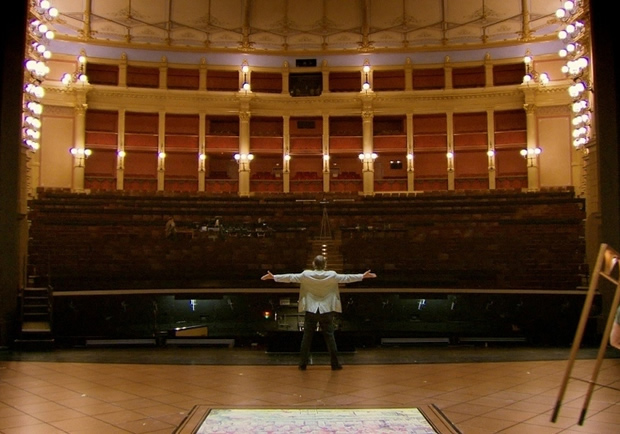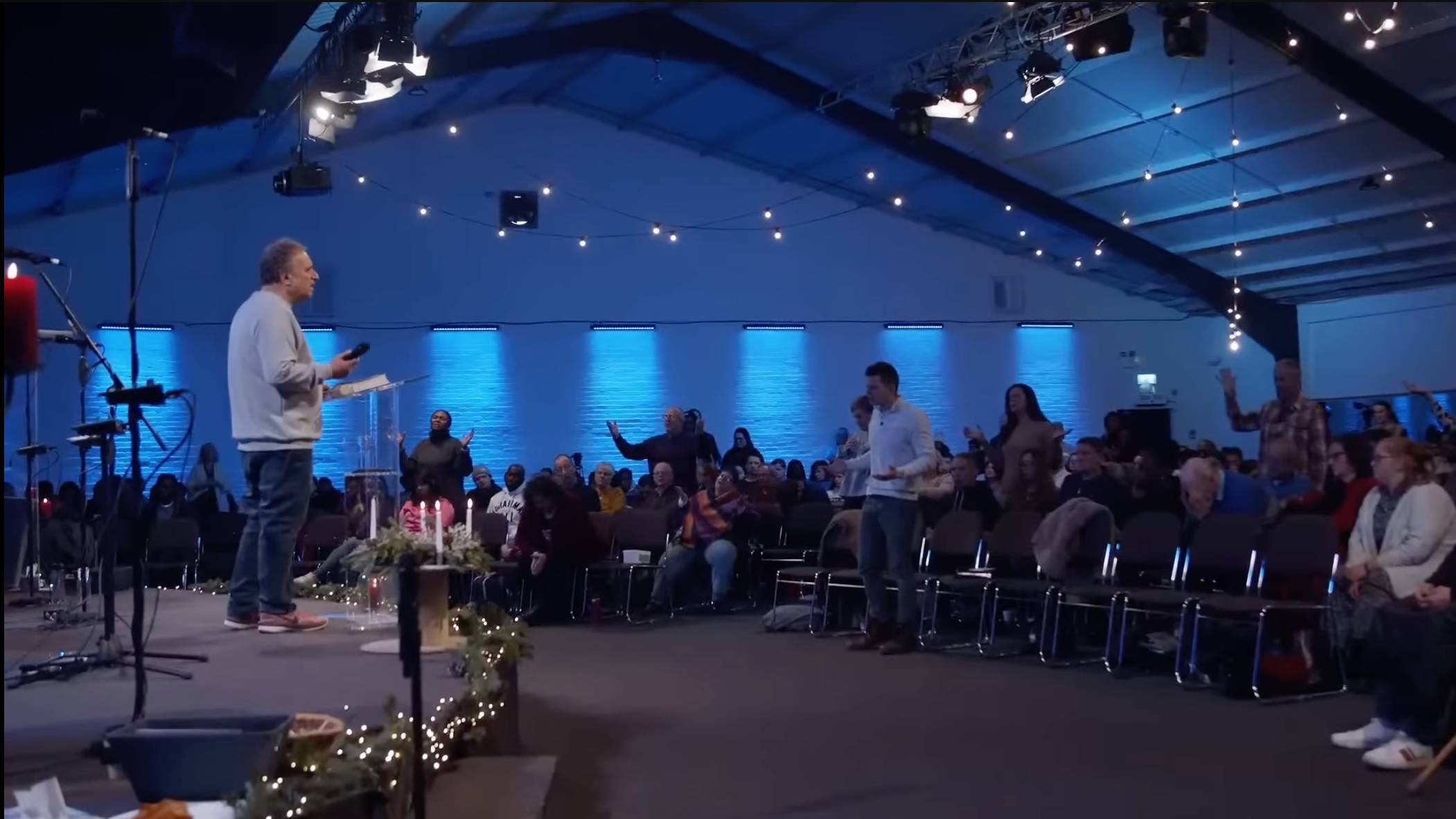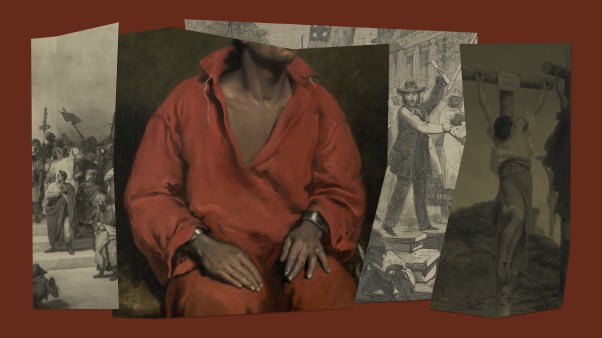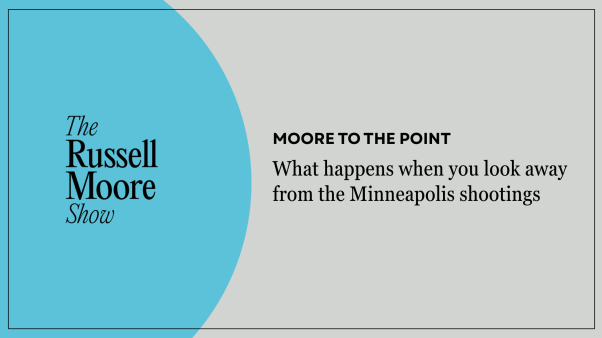"Music can change the world," Bono once said, "because it can change people."
No one would dispute his claim. Music's power to soothe, to inspire, even to motivate one to great things is well chronicled through the ages. Nor, on the other hand, is there little argument about music's ability to provoke, to rile, even to stir up trouble.
But to kill? Maybe.
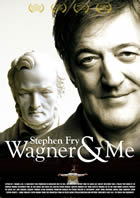 The last Soul Survivor festival, led by popular British evangelist Mike Pilavachi, marked the end of an era.
The last Soul Survivor festival, led by popular British evangelist Mike Pilavachi, marked the end of an era.What began as a gathering of around 2,000 young people at a campsite in southwest England had grown into a movement of tens of thousands, with 32,500 people—mostly teens—attending the final event in 2019.
Pilavachi was the founder and figurehead of Soul Survivor and the driving force behind a movement that had embraced charismatic gifts and inspired a generation of young Brits to pursue Christianity in an age when the country’s churches struggled to retain teenage worshippers.
Before this year, the first line in a recent statement from the youth ministry charity Youthscape would have read as a tribute to his legacy: “Mike Pilavachi’s influence is such that a significant proportion of Christians in the UK and beyond will feel some connection to the ministry of Soul Survivor.”
Instead, it was a warning. As the Church of England conducts a safeguarding investigation into allegations against Pilavachi, Youthscape issued a 2,600-word guide to help leaders respond.
“This news is likely to be disorientating,” the charity wrote. “It could be causing us to question memories or experiences of the festivals we hold dear. We might feel disappointed, angry, or betrayed hearing that someone we trust is under investigation in this way.”
Pilavachi’s case comes as the church faces growing scrutiny over its safeguarding policies and response to abuse, with a string of leaders facing accusations spanning decades.
The claims against Pilavachi first became public in May, when British media published accounts from men who said Pilavachi massaged, straddled, and wrestled with them and others as teens.
Some had been involved in a gap-year program as interns. Alleged victims also described the emotional torment of falling out of favor with Pilavachi, an influential ministry leader.
“Young men were being picked up then discarded year after year. Like me, they would leave feeling like it was them who had messed up,” one said. “Mike had the power to break your career … The only doors that would open for you were the ones that he opened for you to go through. For a teenager, it was emotionally devastating.”
It is unclear what spurred the reporting of allegations to the Church of England this year. The church initially described the allegations as “non-recent,” but the qualifier was later removed. Some said that concerns had been raised as early as 2004.
Pilavachi resigned in July from his church, Soul Survivor Watford, seeking “forgiveness from any whom I have hurt,” but declined to comment further.
Pilavachi was ordained in the Church of England in 2012. The allegations against him follow high-profile cases of clergy who have used their position to abuse boys and young men in church. A few years ago, evangelical leader Jonathan Fletcher, who had served for 30 years at Emmanuel Church, Wimbledon, faced allegations of massages and naked beatings.
A review of the church’s handling of his case underscored the risk of spiritual abuse by church leaders, noting that “the issue of consent requires further legislative scrutiny in contexts where there is a significant imbalance of power and/or status and/or age, including in a religious context.”
Pilavachi began his ministry as a youth leader at St. Andrew’s Church, a charismatic evangelical church in Chorleywood. He opened a café—Dregs—to reach young people. That ministry grew into a congregation of its own, Soul Survivor, which opened at a warehouse in nearby Watford.
While the average churchgoer in the United Kingdom is over 60, Soul Survivor Watford bucked Anglican trends and stereotypes. It was a congregation full of teens, led by high-energy lay leaders like Pilavachi. The vicar at St. Andrew’s, the Rt. Rev. David Pytches, was Pilavachi’s mentor and the church maintained a connection to Soul Survivor.
In Watford, the two pastors who led alongside Pilavachi—Andy Croft and Ali Martin—have known Pilavachi since they were teenagers. Croft, Soul Survivor’s senior pastor, was one of Pilavachi’s interns, while Ali Martin, assistant pastor, participated in a leadership and discipleship program after attending the first festival in 1993. Both were suspended in June, with a statement from Soul Survivor stating that this related to “concerns over the handling of allegations.”
The response to the allegations against Pilavachi has reflected the silos within the broader Church of England—charismatic evangelicals were immediately shocked and shaken by the news and some Anglicans were unaware of Pilavachi’s ministry at all.
Within the Church of England, charismatic revival, with its emphasis on baptism with the Holy Spirit and spiritual gifts such as speaking in tongues, has been a major influence in recent decades. The Archbishop of Canterbury is among those shaped by it. But it has not been universally welcomed. Some Anglicans are sympathetic to Joseph Butler, the 18th-century bishop of Bristol, who told John Wesley that “the pretending to extraordinary revelations and gifts of the Holy Ghost is a horrid thing, a very horrid thing.”
The debate came before the Church of England’s General Synod in 1981, with critics concerned that the charismatic movement was divisive and represented a “flight from the rational and intellectual.” But it was also celebrated for having transformed parishes, making worship “warm, vibrant and meaningful for many Christians who had previously felt coolness and aridity.”
In Pilavachi’s case, his ministry was heavily influenced by John Wimber, the American Vineyard leader and “signs and wonders” evangelist who made his first of several trips to the UK in 1981.
In the same year that the Synod was debating the charismatic movement, this American visitor was having a dramatic impact on leading evangelical parishes in the country, including St. Andrew’s in Chorleywood, his first stop.
The vicar, David Pytches, said there was “holy chaos,” with people falling down in the pews. A later visit transformed life at Holy Trinity, Brompton, home of the Alpha course, and now a major church-planting force in the Church of England.
Pilavachi’s first encounter occurred two years later in 1983, when Wimber addressed a worship conference in London. Pilavachi recalled in his book For the Audience of One being “totally unhinged” by the singing. “I spent a whole part of the week just crying and sniffling my way through songs … Many of the songs were incredibly simple and yet totally intimate. As I worshipped, I found healing for my soul. Intimacy set me free.”
In the years to come, this approach to worship would become central to Soul Survivor’s ministry. Soul Survivor has served as a stable for musicians worldwide, including Matt Redman and Tim Hughes. (Last month Redman commented on the Pilavachi allegations, revealing that he had “experienced first-hand the harmful behaviors that have been described.”)
If music was one part of Wimber’s impact, the other was a theology that democratized supernatural ministry. Among Wimber’s mottos was “Everyone gets to play.” This was the approach that Pilavachi adopted in ministry, preaching that the gifts of the Holy Spirit were for all of God’s people, and encouraging young people to pray for one another accordingly.
While he was careful to speak about the dangers of “hype” and encouraged simple prayers and waiting on God, this ministry could have dramatic outward effects from crying to shouting and falling down. It was also a key part of what drew young people to Soul Survivor.
“Soul Survivor is one of the most tangible times where I have been able to meet with God and have seen other people meet with God,” one young festival-goer told the Church Times at the final 2019 gathering.
On stage, Pilavachi was a captivating speaker, combining an easy informality and deadpan wit—often entailing self-deprecating confessions—with passionate exposition of Scripture and unabashed accounts of his own relationship with Jesus. In many ways, he defied expectations of Christian celebrity leaders.
In My First Trousers, a book on growing in faith that is part-memoir, Pilavachi described himself as a “swollen-bellied and gently maturing afro-haired bloke from Harrow,” a London suburb.
In the same book, he wrote that it was “vital that we Christians perform regular safety checks on ourselves,” adding that his own friends “know I want them to tell me anything they notice about my attitudes or behaviour which worries them.”
“Mike was not thought to be a Christian celebrity,” wrote Lucy Sixsmith, a PhD student at the University of Cambridge, in a blog reflecting on her own experiences of Soul Survivor.
“Vulnerability, self-deprecation: that was Mike’s thing … Mike’s audiences heard about the brokenness in his youth that led him to Jesus, the bouts of depression that hit during and after the summer festivals, his loneliness, his occasional habit of hiding from his friends … Soul Survivor seemed to be the genuine article. Mike Pilavachi did not seem to be a Christian celebrity.”
She went on to suggest that “vulnerability could be toxic, a place to hide, a way to deflect scepticism: if a Christian celebrity sends himself up or strategically reveals some struggle or other, we all ask fewer questions about what power he has in fact, for all his gentleness.”
Hers is one of a growing number of stories being shared online of Soul Survivor and Pilavachi. Former staff members, interns, congregation members, and festival-goers have turned to the internet to process their memories and thoughts amid the Church of England’s investigation. This has included reflections that have gone beyond the specific allegations to explore the nature of charismatic ministry.
In its guide to healthy discussions with young people, Youthscape suggests, “If the allegations are true, it doesn't undermine everything that happened at the festivals, programmes or church … If you have had an experience of God through Soul Survivor, and this seemed real to you, you don't have to abandon it, whichever humans were involved in leading at the time.”
But others have questioned this. Luke Larner, an Anglican priest who served on the “prayer and prophecy team” at the summer festivals, has asked: “What if the intense experiences, what if the incredible emotional highs of being in a big top with thousands of other young people, what if the overwhelming desire to be something bigger than ourselves, what if hearing a ‘mission from God’—what if it wasn’t real? What if it wasn’t God? What would that mean?”
While Christians await the report, it is these accounts that are driving discussion within the Church of England about what happened at Soul Survivor and what the implications are for youth ministry and safeguarding in the future.
Though some had never heard of Pilavachi, they have now, and with so many of the church’s youngest worshippers having experienced his ministry, they are forcing the conversation beyond its silos.
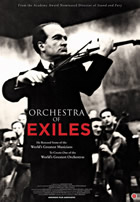 Illustration by Christianity Today / Source Images: AP Images / WikiMedia Commons
Illustration by Christianity Today / Source Images: AP Images / WikiMedia CommonsTwo compelling new documentaries examine music's role—for good and for evil—during the rise of the Third Reich. One, Wagner & Me, explores how the great German composer's works may have played a part in Hitler's anti-Semitism and the advent of Nazism. The other, Orchestra of Exiles, tells almost the opposite tale—how music was used for the greatest good, sparing the lives of almost 1,000 Jews just as the Holocaust was about to begin.
Both are new releases from First Run Features, long one of my favorite sources for fascinating and often daring documentaries on a wide variety of topics. Wagner & Me and Orchestra of Exiles are now available at First Run's website.
And both fully bear witness to the gut-wrenching truth of Bono's quote, that music can—and often does, as history bears out—change the world. For better or for worse.
Near the beginning of Wagner & Me, host and narrator Stephen Fry describes his lifelong love of music: "[It has] always made me do things inside. It's released forces within me. And no music has done it like Wagner's."
Hitler may well have said the same, especially the part about it "releasing forces within me." (Several decades later, Tom Waits would say, "I like beautiful melodies telling me terrible things," but I don't think he was channeling Hitler.) Fry, who is Jewish, explores the connection between Wagner's music and Hitler's worldview, and how the former may have influenced the latter . . . and, of course, the atrocities that followed.
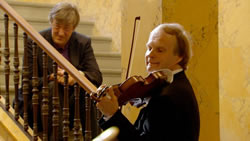
Fry, a lifelong Wagner aficionado, takes us on what amounts to an educational travelogue with the 19th century composer. The film begins and ends in Bayreuth, Germany, where Wagner had a custom opera house built in his later years (and where his epic Der Ring des Nibelungen, aka The Ring Cycle, was first performed in 1876) and where an annual Wagner festival is held to this day. Fry follows Wagner from Germany to his 12-year exile in Switzerland (he was a wanted man for his role in a political uprising in Dresden), to Paris, to Russia, to his return to Germany and, ultimately, back to Bayreuth.
It's all sufficiently informative, an adequate primer on the life of the man. But the heart of the film belongs to Fry, his articulate wit and brilliance front and center. It's a joy to see him utterly rapturous as he listens to orchestras rehearse, to singers sing, and to a professional pianist playing portions of Tristan und Isolde. (When the pianist tells Fry to play the final note to end the marvelous piece, his finger misses by one key—and the result is both melodically disastrous and hilarious.)
Fry and the filmmakers seamlessly alternate between biographical bits, interviews, and sense of place, often with Wagner's music soaring in the background. But most compelling is Fry's own journey as he wrestles with the film's overriding and underlying question.
Can he—indeed, can any of us—separate Wagner's brilliant work from its apparent role in the rise of the Third Reich and the extermination of 6 million Jews?
Fry, who lost relatives at Auschwitz, clearly grapples with that question throughout, especially during a visit to Nuremberg, where Hitler staged his propaganda rallies in a massive stadium while Wagner's Die Meistersinger blared over the loudspeakers—a sort of soundtrack for the 100,000 goose-stepping soldiers in the field below. (A Wagner scholar says the music presents a "dialectic" worldview—protagonist vs. antagonist, or, in Wagnerian terms, Siegfried vs. the dragon. "The opera needs the tension of drama between good and evil," he explains. "But as soon as you turn it into reality, it becomes a devastating political fantasy and ideology"—which may have been Hitler's intent.)
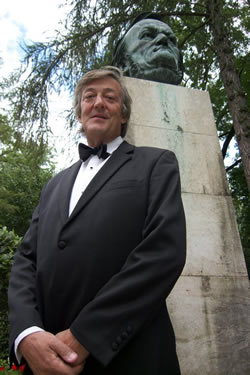 Screengrab / Soul Survivor
Screengrab / Soul SurvivorIn one sobering moment, Fry, talking directly to the camera, is sitting in the arena, contemplating and contending with these issues. He looks at the podium where Hitler stood, giving the Nazi salute while overlooking his army, and notes that it's the spot tourists typically go to for a photo op. Fry can't bring himself to even approach the platform: "I don't think I want to put myself in that position." He says he's "deeply uncomfortable" because "I realize how close to the Nazi fantasy world Wagner was, and how deeply stitched into Hitler's vision of the world. It's very difficult." (Wagner's own anti-Semitic attitudes came through in some of his writings, political views, and music.)
Fry continues: "I imagine it like this. Imagine a great, beautiful, silk tapestry, of infinite color and complexity, that has been stained indelibly. It's still a beautiful tapestry of miraculous workmanship and gorgeous color and silken texture. But that stain is real. And I'm afraid Hitler and Nazism have stained Wagner. For some people, that stain ruins the whole work. For others, it is just something you have to face up to. And here's a place, as storm clouds gather in Nuremberg, to think about such things."
The camera lingers on Fry, who slowly looks away. He looks as if he may weep.
There's another poignant moment near the end of the film, when Fry interviews a London woman who survived at Auschwitz—likely because she played the cello and was tapped to be in the inmates' orchestra. She remembers being forced to march naked before Nazi guards. She also recalls having to play a particular piece (not Wagner, but Schubert) for an audience of one—none other than Josef Mengele, the SS physician notorious for performing human experiments on concentration camp inmates, including children.
Fry asks the woman if she thinks he is "betraying my Jewishness by playing Wagner and liking him." She tells Fry that he'll have to figure that out for himself. But when she learns that he plans to attend the Wagner festival, she asks him outright: "Why do you have to listen to Wagner in Bayreuth, which is so symbolic of everything terrible? Why can't you just sit at home and listen to a record?"
"That's a very good question," Fry replies. He tries to explain, but he's not entirely comfortable with or convinced by his answer. He's still asking the question himself.
Fry does return to Bayreuth for the festival, and ends up—at least in his mind—answering the question to his own satisfaction. It's an interesting and, I believe, wholly appropriate conclusion. You'll have to watch to see what it is.
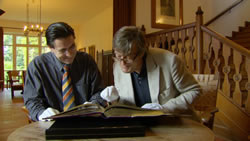
Just how significant a role Wagner's music actually played in the rise of the Third Reich—and the extermination of 6 million Jews—is still debated by scholars and historians. But there is no debate about the role of music in Orchestra of Exiles, which chronicles the amazing story of how one man saved Europe's premier Jewish musicians from obliteration by the Nazis. Think of it as something like Schindler's List meets The Sound of Music.
Through documentary and reenactments, Orchestra of Exiles tells the story of Bronislaw Huberman, a Jew born in Poland in 1882 who became one of the world's finest violinists before Hitler rose to power. Huberman had attracted the attention of Brahms as a child prodigy, and made a small fortune as a teenage whiz kid while touring Europe, the United States, and even Russia.
As World War I raged throughout Europe, Huberman, deeply affected by its horrors, became more politically aware—and politically active, embracing the Pan-European movement after the war. He joined Einstein, Freud, and others in writing and speaking out in support of the movement.
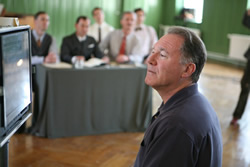
As Hitler came to power in the early 1930s, Huberman saw the writing on the wall, taking the Fuhrer's anti-Semitic rants more seriously than many Jews did. As Hitler fired thousands of professional Jewish artists—including many musicians—from their posts, Huberman, by now an outspoken opponent of Nazism, began to develop an idea.
After playing a series of concerts in Palestine in 1934, his idea was fully formed: He decided to create a world-class orchestra in Palestine, made up primarily of Jews from all over Europe who were losing their jobs with their local symphonies. "One has to build a fist against anti-Semitism," Huberman wrote. "A first-class orchestra will be this fist."
Huberman spent the next two years traveling around Europe, auditioning Jewish musicians for his orchestra. He knew he could only take the best musicians, and steeled himself for what would happen to those he didn't choose. In essence, he put himself into a position of deciding who would ultimately live and who would die. His vision was prescient; he sensed that not only were German Jews in mortal danger, but Jews throughout Europe. But in 1936, many Jews believed that Nazism was just a phase that would eventually blow over, so Huberman had a difficult time convincing many of the coming horrors. Somehow, Huberman sensed the Holocaust long before it came.
When he auditioned musicians in his homeland of Poland, many were among his friends. So, rather than have personal feelings dictate his choices, he held "blind" auditions—turning his back while they played, choosing solely for their music ability.
As the orchestra began to take shape, many musicians asked to bring their families too—and somehow, the deeply connected Huberman, who had many friends in high places, was able to work it out. There were plenty of kinks and bureaucratic roadblocks along the way—including in then British-controlled Palestine, where there were last-minute snags with Arab uprisings and other conflicts, both armed and bureaucratic.
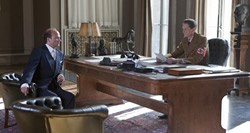 Robert F. Bukaty / AP
Robert F. Bukaty / APWhat's most remarkable about Huberman's quest is that so little of it was done in secret. He had recruited Italian maestro Arturo Toscanini, also known for his anti-Nazi views, to conduct the initial concerts in Palestine, and worldwide media picked up on the story. Huberman even played 42 concerts in 60 days in the U.S. to raise money for the venture. (His 1713-vintage Stradivarius was stolen during a 1936 Carnegie Hall show, and would remain missing for 50 years, until the thief confessed on his deathbed that he had stolen it. The violin eventually ended up with American violinist Joshua Bell, who purchased it in 2001 for $4 million. Fitting, then, that Bell is Jewish.)
After his concert tour, Huberman still needed $80,000 to meet the start-up costs for his dream orchestra. He contacted Albert Einstein, then the most famous Jew in the world, to host a fund-raising dinner at New York's Waldorf Astoria—and finally, Huberman had the finances to move forward.
When the musicians and their families traveled from throughout Europe to Palestine—many for the first time in their lives—they stepped off the boat in Haifa, only to find mostly sand, intense heat, lots of bugs, and a few buildings. Some wondered what they had gotten themselves into, not yet knowing what would have happened to them had they remained behind in their homelands. (A couple musicians did quit and returned home, only to lose their lives in prison camps.)
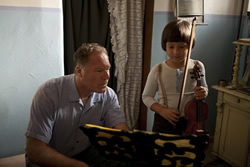
They took a bus to Tel Aviv and began rehearsals for the first concert, to be held December 26, 1936. When Toscanini arrived, there was a media frenzy. A hundred thousand Palestinian Jews were clamoring for the 3,000 tickets. Huberman refused to play those first shows, because he wanted the orchestra to be the star. And as the musicians, under Toscanini's baton, launched into a Rossini overture, history was made. The concert, broadcast around the world, was heard by millions on the radio.
One man, who attended the landmark event as a 6-year-old, told the filmmakers that "it was a feeling of victory." The Palestine Post reported, "Mr. Huberman has turned a great calamity into a unique opportunity." And a descendant of one of the original musicians said that Huberman "was one of the great liberators of the world."
Bono was right. Music can change the world. Because it did.
Mark Moring, a former film and music editor at CT, is a writer at Grizzard Communications in Atlanta.

